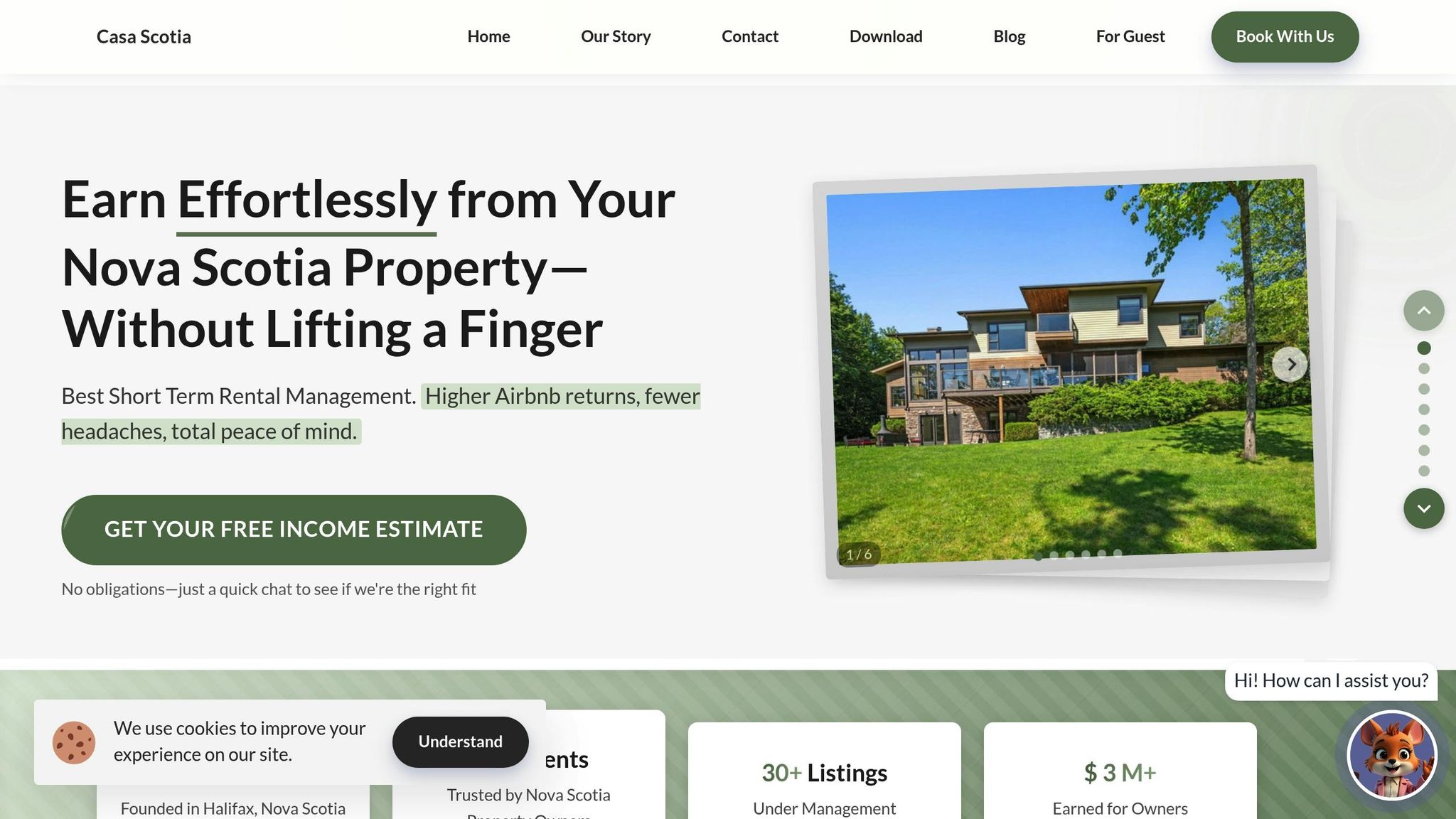Navigating Lunenburg's rental market requires understanding three key aspects: compliance with regulations, heritage preservation, and guest expectations. Lunenburg, a UNESCO World Heritage Site, attracts tourists seeking its maritime history and scenic charm, driving demand for short-term rentals. However, strict provincial laws, municipal bylaws, and heritage rules govern properties, especially in the Old Town area. Owners must balance these requirements with guest demand patterns influenced by local events and currency exchange rates. Success lies in meeting legal obligations, respecting heritage standards, and catering to visitor preferences.
Key points:
- Regulations: Properties rented for 28 days or less must register under Nova Scotia's Short-Term Rentals Registration Act and comply with local bylaws.
- Heritage Properties: Strict rules govern exterior modifications, requiring permits and historically accurate materials. Specialized insurance and compliance with fire safety standards are often necessary.
- Guest Demand: Peaks during local events and when the Canadian dollar weakens, offering opportunities for strategic pricing.
- Professional Management: Services like Casa Scotia can handle compliance, guest screening, and dynamic pricing, ensuring smooth operations.
Preserving Lunenburg’s charm while meeting modern rental demands is challenging but achievable with informed planning and management.
Legal Requirements for Short-Term Rentals
In Nova Scotia, short-term rentals fall under the Short-Term Rentals Registration Act (STRRA). This legislation requires all properties rented out for 28 days or less to be registered annually with the provincial Short-Term Rentals Registry.
Beyond provincial registration, it's crucial to also review and adhere to local municipal bylaws, as additional rules or requirements may apply. Always double-check that your property meets both provincial and municipal regulations before listing it for rent.
Heritage Property Rules and Restrictions
Heritage properties in Lunenburg come with an added layer of oversight, designed to preserve the town's historical charm. These rules build on provincial and municipal regulations, ensuring that the unique character of the area remains intact.
Operating a short-term rental in Lunenburg's heritage district means following strict guidelines that govern everything from exterior modifications to property maintenance. These measures aim to balance modern use with the preservation of historical features.
How Heritage Status Affects Rentals
Owning a heritage-designated property means that any changes to the exterior - like replacing windows, updating paint colours, or altering signage - must be approved by the local heritage advisory authority. This ensures that the property's historical appearance is maintained. While interior changes are less restricted, structural modifications still require additional review to ensure they align with preservation standards.
Heritage designation can also impact insurance. Standard policies may not cover risks unique to historical properties, often requiring specialized coverage. Additionally, meeting modern fire safety and accessibility standards while preserving the property's historical elements can be challenging, sometimes calling for creative solutions.
Heritage Permits and Preservation Rules
Before making alterations to a heritage property, owners must secure permits that demonstrate how the proposed changes align with preservation goals. Permit applications typically require detailed documentation, including architectural drawings, material specifications, and photographs.
Exterior updates must often follow historically accurate colour schemes and styles approved by local heritage authorities. For example, replacing windows or roofing may require the use of specialized materials to replicate the original design. This process is more complex and time-consuming than for non-heritage properties, reflecting the importance of maintaining historical authenticity.
The following table outlines the main differences between heritage and non-heritage properties:
Heritage vs. Non-Heritage Properties
| Aspect | Heritage Properties | Non-Heritage Properties |
|---|---|---|
| Guest Appeal | Draws guests looking for a historical experience | Focuses on modern amenities and location |
| Renovation Flexibility | Requires detailed approvals and specialized materials | Allows greater freedom for modifications |
| Compliance Requirements | Must follow additional heritage preservation rules | Governed by standard municipal bylaws |
| Insurance Considerations | Needs specialized insurance for historical risks | Covered by standard property insurance |
| Maintenance & Approvals | Demands rigorous upkeep and longer approval timelines | Involves simpler processes |
| Marketing Advantage | Appeals to niche markets valuing historical authenticity | Promotes convenience, amenities, and location |
While heritage properties can attract a niche market willing to pay premium rates for an authentic historical experience, the additional regulations and maintenance demands require thoughtful planning. Partnering with contractors experienced in heritage restoration can help ensure that any updates are both compliant and respectful of the property's historical value.
Guest Demand Patterns in Lunenburg Area
The ebb and flow of guest demand in Lunenburg often mirrors market dynamics and local happenings. By understanding these patterns, property owners can fine-tune their offerings to align with visitor preferences. Two major factors influencing booking trends in the area are local events and currency exchange rates.
Local Events
Local events are a magnet for visitors, sparking a surge in bookings. Festivals, community celebrations, and other gatherings often draw travellers eager to experience the charm of Lunenburg during these special moments. For property owners, keeping an eye on event calendars can be a game changer. Adjusting availability or tweaking pricing strategies to match these high-demand periods can make a big difference.
Currency Exchange Rates
Currency fluctuations also play a role in shaping demand. When the Canadian dollar weakens, it becomes a more attractive destination for international travellers, leading to a noticeable boost in bookings. This trend highlights the importance of monitoring exchange rates to anticipate shifts in guest demand.
sbb-itb-b5e1074
Managing Compliance and Bookings
Running a short-term rental means juggling compliance with local regulations, optimizing revenue, and maintaining positive relationships within the community.
Step-by-Step Compliance Process
Start by contacting your local development office to confirm whether your property has a heritage designation and to understand the regulations and permits that apply.
For heritage properties, compliance can be more intricate. Properties located in Historic Commercial Areas Overlay Districts or those officially designated - like Provincially Designated Historic Resources - must adhere to specific guidelines. These rules can affect both the initial setup and ongoing operations. However, most interior maintenance and minor renovations are typically exempt from permits, as long as they don’t alter the structure, use, or key character-defining features of the building [1].
Keep detailed records of your property’s heritage status and any correspondence with municipal authorities. This documentation can be crucial if questions about compliance arise or if you plan future upgrades to enhance the guest experience.
If you’re considering changes - like updating a kitchen or revamping outdoor spaces - consult the municipal development department early. Major projects, such as façade renovations, often require permits and approval from a Historic Resources Advisory Committee to ensure they align with preservation goals [1]. Early consultation can save you from costly errors and delays.
Lastly, ensure your guests understand and respect these heritage standards to protect both your property and the surrounding area.
Guest Screening and Management
Managing guests effectively is essential to protect your property and maintain harmony with the local community. Heritage homes are often nestled in residential neighbourhoods, where good relations with permanent residents are key to long-term success.
Screen guests carefully by checking their past reviews and clearly outlining your expectations before they arrive. Be upfront about occupancy limits, noise restrictions, and any heritage-related rules - such as parking limitations or exterior-use constraints - that could impact their stay.
Staying on top of tax obligations is another key aspect of compliance. Ensure you’re up to date with HST requirements and local accommodation taxes. To simplify things, you might want to include these costs in your nightly rates. Additionally, remind guests of any heritage-specific restrictions when they book, reinforcing the importance of treating the property and area with care.
Monitor how your rental impacts the surrounding heritage area. This includes ensuring guests understand they’re staying in a historically significant property that requires thoughtful behaviour.
Casa Scotia's Full-Service Management

Once your compliance processes are in place, professional management can help maximize your rental’s potential. Casa Scotia specializes in handling both compliance and booking management for properties in Nova Scotia.
They start by staging your property and providing professional photography that showcases its heritage charm while appealing to modern travellers. This approach highlights the property’s historical features while ensuring it’s comfortable and inviting for guests.
Casa Scotia also uses dynamic pricing to adjust rates based on local events, currency fluctuations, and seasonal trends, helping you make the most of your rental income.
Their owner portal keeps you in the loop with real-time updates on bookings and property status. Meanwhile, Casa Scotia takes care of the day-to-day tasks, including compliance, guest screening, and maintenance coordination. Monthly financial reports provide a clear breakdown of revenue, expenses, and occupancy rates, helping you plan for improvements and budget for preservation needs.
Casa Scotia’s expertise doesn’t stop there. They understand which upgrades can enhance the guest experience without triggering permit requirements. They also work with local contractors experienced in heritage properties and can guide you toward funding opportunities, like the Heritage Preservation Partnership Program, which offers matching grants for preservation efforts [1].
"By preserving these buildings, we honour our community's past, support local tourism, and promote economic vitality."
- Preserving Our Heritage: A Guide for Historic Property Owners [1]
With this comprehensive approach, your property can succeed as a short-term rental while remaining a treasured part of Lunenburg’s rich history.
Conclusion: Success Through Compliance and Market Knowledge
Thriving in Lunenburg's rental market requires a careful mix of following regulations, preserving heritage, and understanding what guests want. Property owners who master this balance can enjoy profitable ventures while supporting the charm of their historic communities.
The backbone of sustainable operations is compliance. Whether you're overseeing a heritage property in downtown Lunenburg or a contemporary home nearby, staying informed about municipal bylaws, provincial rules, and tax requirements protects your investment and ensures long-term success. While managing heritage properties may come with extra hurdles, these very challenges can make them more appealing by offering guests a genuine slice of history.
Timing and pricing are crucial in a market driven by seasonal tourism. Properties that leverage peak travel periods and emphasize standout features - like waterfront views or proximity to local attractions - can maximize their earning potential. This strategy works especially well for heritage properties, which already have a unique allure.
Preserving Lunenburg's historic charm isn’t just about tradition - it’s also a smart business move. Visitors are drawn to authentic experiences, and Lunenburg’s reputation as a historic destination amplifies that appeal. Combining the old-world charm of these properties with modern amenities creates a compelling offer for today’s travellers.
Managing all aspects - compliance, guest satisfaction, and revenue - can be overwhelming. Partnering with local professional management services can streamline these responsibilities, ensuring steady income without sacrificing quality.
Ultimately, success in Lunenburg’s rental market lies in respecting its heritage while catering to modern expectations. It’s about maintaining the town’s unique charm while enhancing its role as a vibrant tourist destination.
FAQs
What are the main rules for running a short-term rental in Lunenburg, especially for heritage properties?
If you're planning to run a short-term rental in Lunenburg, especially in a heritage property, there are some specific rules you'll need to follow to help preserve the town's historical and architectural charm. For starters, you'll need to submit a Heritage Development Encroachment Application, which requires a detailed floor plan and a written request. The processing time for this is usually around 14 days.
On top of that, property owners must adhere to the Heritage Property Act, which is designed to safeguard designated heritage sites. If you're considering making major changes to a heritage property, you might also need a Heritage Certificate of Appropriateness or a Heritage Permit. These requirements ensure that the property retains its historical significance while being used as a short-term rental.
How can property owners in Lunenburg maintain heritage charm while meeting modern guest needs?
Balancing the charm of Lunenburg’s historic heritage with the needs of modern travellers takes careful planning. Property owners should ensure compliance with local heritage regulations, such as securing permits for exterior renovations and adhering to the guidelines outlined in the Heritage Property Act. Thoughtfully incorporating modern conveniences - like updated kitchens or reliable Wi-Fi - can elevate guest comfort while preserving the property’s historical essence.
Engaging with local heritage advisory committees and familiarizing yourself with community guidelines can help you make updates that respect Lunenburg’s storied past. By following these practices, property owners can offer a rental experience that stays true to the town’s history while meeting the expectations of today’s visitors.
How can property owners in Lunenburg adjust their short-term rental pricing effectively?
To set the right price for short-term rentals in Lunenburg, property owners should weigh several key factors like seasonal demand, local events, and the distinct features of their property. For instance, during peak tourist times or when festivals are in full swing, demand tends to soar - making it a prime opportunity to adjust rates.
Owners also need to be mindful of heritage restrictions and local bylaws. These regulations might limit certain upgrades or amenities, which could influence pricing. Staying updated on these rules not only ensures compliance but also helps preserve the charm that draws visitors to the area.
Lastly, keeping an eye on local market trends and understanding what guests look for can refine pricing strategies. This balanced approach helps property owners boost bookings and revenue while honouring the community's heritage and character.



